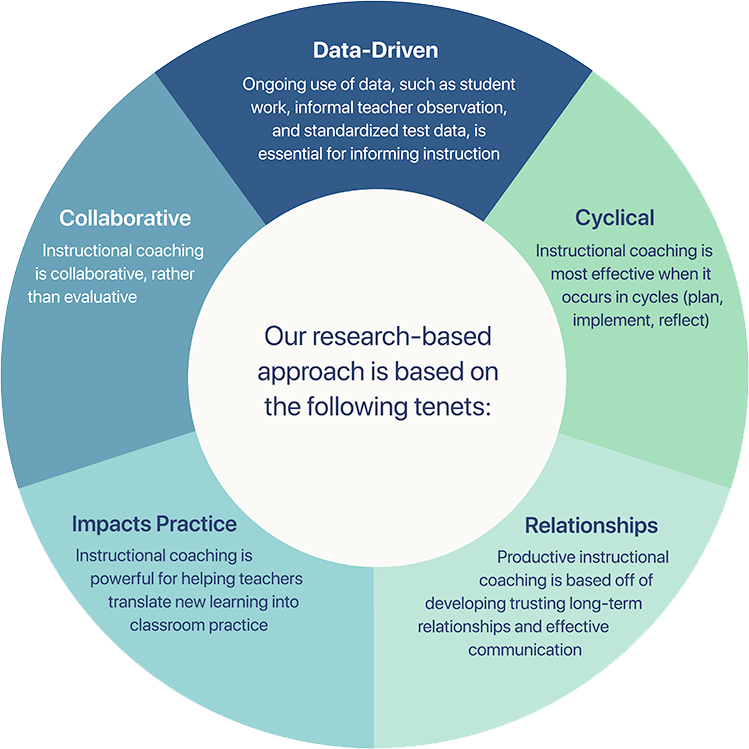Your cart is currently empty!

Staff-Instructional/Curriculum Coach: Mrs. Boardman




THE CURRICULUM COACH: The curriculum coach collaborates and supports teachers in using the curriculum to analyze students’ strengths and target areas for improvement. Coaches understand how each curriculum is structured.
INSTRUCTIONAL COACH: An instructional coach works with teachers to improve the quality of their lessons and the quality of students’ education. They serve as mentors and role models, helping teachers stay fresh and use the latest techniques and technologies in their classrooms. A career in coaching is well-suited to those who want to help other teachers, and therefore their students, flourish.
ESSENTIAL FUNCTION AS CURRICULUM COACH:
Assists K through 6 teachers with improving techniques for instruction and improving overall student achievement; provides instructional strategies and various tools to aid the instructional process; observes teachers and provides feedback and/or demonstration lessons.
Assists with the overall evaluation of district initiatives and programs and develops strategies for improvement; coordinates and provides staff development opportunities.
Ensures teachers and principals are familiar with any changes to the North Carolina Curriculum; designs curriculum, new course offerings and guidelines for student placement.
Assist with the development of district assessment tools.
Assists the school system with the acquisition of appropriate textbooks, teacher guides and other instructional materials and equipment.
Keeps parents, administrators and community citizens informed about various district initiatives to resolve educational issues.
Schedules and conducts meetings for school contacts as assigned.
Participates in regularly scheduled departmental meetings as required.
Assists Director with budget development.
Collaborates with other curriculum & academic coaches to provide an integrated program. Provides support to teachers in their classrooms through coaching, modeling, and mentoring.
What Does an Instructional Coach Do?

An instructional coach is in charge of professional development at a school, but that’s not all they do. While the specifics of the job might vary from place to place, here are some of the tasks an instructional coach might be asked to perform throughout their coaching career:
- Overseeing teachers professional development. A school is only as good as its teachers, and a large part of an instructional coach’s job is taking responsibility for their continuous growth. That can mean mentoring, observing classes, and providing feedback. But remember, some teachers might be sensitive to feedback, so a high level of emotional intelligence is required for this role.
- Teaching and technology. Education is a fast-moving field. An instructional coach is required to stay on top of the latest changes in teaching practices and classroom technology, and demonstrate how to use these tools and methods effectively in the classroom.
- Modeling classes. It’s not just about observing teacher’s classes and helping them improve. An instructional coach will be expected to show them how it’s done. Instructional coaches will have to demonstrate the latest practices in front of students and other (highly experienced) teachers, so confidence in one’s teaching ability is a must.

Hours:
• M,W,Th 7:30am-4:00pm
Email:
diane.boardman@fppsphoenix.net
——————————————
I have been in the education field for 45 years. I worked in the public schools for 35 years and the rest of my teaching time has been here at Franklin Sunnyslope. I have taught 1st grade, 2nd grade, 3rd grade, 4th grade, 6th grade and 7/8th grade Science. I have left my kid days behind and now I enjoy working with teachers.
I am a wife, mother, and grandmother. I enjoy working part time so I can spend time with my grandkids.
Teaching is fundamentally a process, including planning, implementation, evaluation and revision. Planning and teaching a class are familiar ideas to most instructors. More overlooked are the steps of evaluation and revision. Without classroom assessments or some other means of receiving feedback on a regular basis, it is surprisingly easy to misunderstand whether a particular teaching method or strategy has been effective. A teacher can create an environment of mutual trust and respect by relying on students for feedback — students can be a valuable resource for verifying whether the class pedagogy is (or isn’t) working. Self-examination with feedback from your students and the instructor are key to improving your teaching.
PLANNING
There are many different levels of setting goals for teaching, from the scale of an entire semester (syllabus) to a single class (lesson plan). You have the overall task of helping your students learn how to think critically and to understand the basic concepts and tools of your discipline. You should also have more specific day-to-day goals, such as examining the social context of Victorian women writers or demonstrating how to integrate partial differential equations. As a graduate TA you probably will not be responsible for designing an entire course, but you should think about how your day-to-day teaching fits into the larger goals of the course.
REVISION
Revising your pedagogy will help your students learn… and keep you interested. If you keep your focus on student learning, you will find a richer meaning to the typical lecture/discussion/test/grade process. Instead of an adversarial relationship, the teaching process encourages a relationship of cooperation and mutual discovery. Ernest Boyer helped redefine the notion of scholarship, in fact, by including the scholarship of teaching as a culminating activity of the research process of discovery, integration, and application of knowledge (Boyer 1990).
ASSESSMENT
Regular assessment of your students and yourself is critical to your success as a teacher. To really understand whether you are teaching effectively and your students are learning effectively, it is crucial that you actively and regularly assess what your students have learned. If you are able to solicit meaningful feedback from your students and the professor on a regular basis (not just at the end of the semester), you can modify and improve your teaching strategies. Assessments do not need to be overly complex or involved. In fact, the more focused you are in the assessment, the more impact your changes will have.
IMPLEMENTATION
The best plans are meaningless if you don’t try them. Although most of the work in teaching comes in planning and preparation, many great ideas are never implemented because it was easier to just keep doing the same thing. Don’t be afraid if you have and idea you want to try. If something hasn’t been working right, why not change what you are doing and try something new? Unless you are willing to change and experiment, you will find it difficult to improve your teaching skills.
